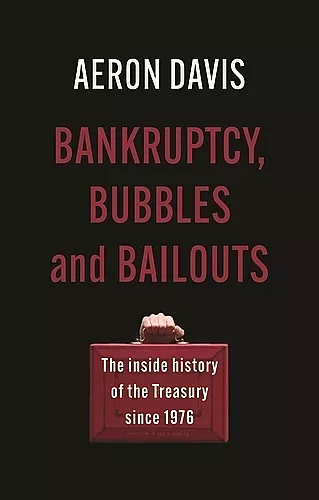Bankruptcy, Bubbles and Bailouts
The Inside History of the Treasury Since 1976
Format:Hardback
Publisher:Manchester University Press
Published:18th Oct '22
Should be back in stock very soon

The Treasury is one of Britain’s oldest, most powerful and secretive institutions, one that has played a central role in shaping the country's economic system. But all too often it has escaped public scrutiny when it comes to investigating the ups and downs of the UK economy.
When portrayed, it is usually as a bedrock of government stability in times of crisis, repeatedly rescuing the nation’s finances from the hands of posturing politicians and the combustions of world financial markets. However, there is another side to the story. In between the highs there have been many lows, from botched privatizations to dubious private finance initiatives, from failing to spot the great financial crisis to facilitating ever-growing inequalities.
Davis’s book goes behind the scenes to offer an inside history of the Treasury, in the words of the chancellors, advisors and civil servants themselves. It shows the shortcomings as well as the successes, the personalities and the thinking which have shaped Britain’s economy since the mid-1970s. Based on interviews with over fifty key figures, it offers a fascinating, alternative insight on how and why the UK economy came to function as it does today, and why reform is long overdue.
'At the heart of British policymaking stands the mighty Treasury, instinctively pro-market, conservative and centralising. Its achievement is to preserve stability and its failure is to stifle innovation. In this superb book, Aeron Davis tells a somewhat depressing story of institutional continuity in the midst of change over half a century. Institutions matter. The example of Her Majesty's Treasury shows how and why.'
Martin Wolf, chief economics commentator at the Financial Times
One of the Financial Times' Best Books of 2022: Economics
'Aeron Davis's balanced, historical account of unaccountable, technocratic power is an essential read.'
Ann Pettifor, author and Director of Policy Research in Macroeconomics at PRIME
'Through fascinating and surprisingly candid interviews with those who ran the Treasury over decades, Aeron Davis has put the politics back into UK economics, revealing the personalities and ideologies that have profoundly shaped the nation's most powerful institution and, through it, the whole economy. For anyone seeking to understand and influence UK policymaking - whichever political party is in power - this book is an essential and riveting read.'
Kate Raworth, author of Doughnut Economics
'After all, as Aeron Davis shows in this perceptive and revealing history of the past half-century of the department that underwrites every British political decision, the Treasury has a very strong instinct for self-preservation. Many of the most important – and the most damaging – policies of recent decades have been developed and promoted by the Treasury’s institutional compulsion to settle the national balance sheet.'
Will Dunn, The New Statesman
'This is a splendid survey of a key department of state. The Treasury dominates the state machine.'
Will Podmore, Morning Star
'It should be clear from this short review that this book is not just an interesting overview of the Treasury over the last 40+ years. It is also an invaluable record of what some of the key political and official actors involved in UK economic policy thought they were doing at the time and how they view that in retrospect. I thoroughly recommend reading it to anyone interested in the recent economic history of the UK.'
Simon Wren-Lewis, Emeritus Professor of Economics and Fellow of Merton College, University of Oxford
'Aeron Davis lucidly and accessibly illuminates an institution, the UK Treasury, that prides itself on being the salvation of the British economy when, in fact, it is a major contributory factor in its sub-par performance. Combining responsibility for controlling the public finances and economic management, the latter has very much played second fiddle, increasingly contracted out to third parties, with over-reliance on a bloated financial sector and successive property bubbles to keep everything afloat. The analysis thematically unfolds from the IMF debacle under the Callaghan Labour Government, to the Brexit and Covid crises under the Johnson Conservative Government. Essential reading for academics as a case study of the importance of an institutional perspective - and for a more general readership to understand all that has gone wrong with the British economy over the last half century.'
Chris Painter, Emeritus Professor of Public Policy and Management, Birmingham City University
'This is a lively book that makes excellent use of its high-profile interviews to highlight an elite view of how the British economy should be managed. I particularly liked the focus on financialization over neoliberalism.'
Duncan Needham, Journal of British Studies
ISBN: 9781526159779
Dimensions: 198mm x 129mm x 19mm
Weight: 435g
328 pages